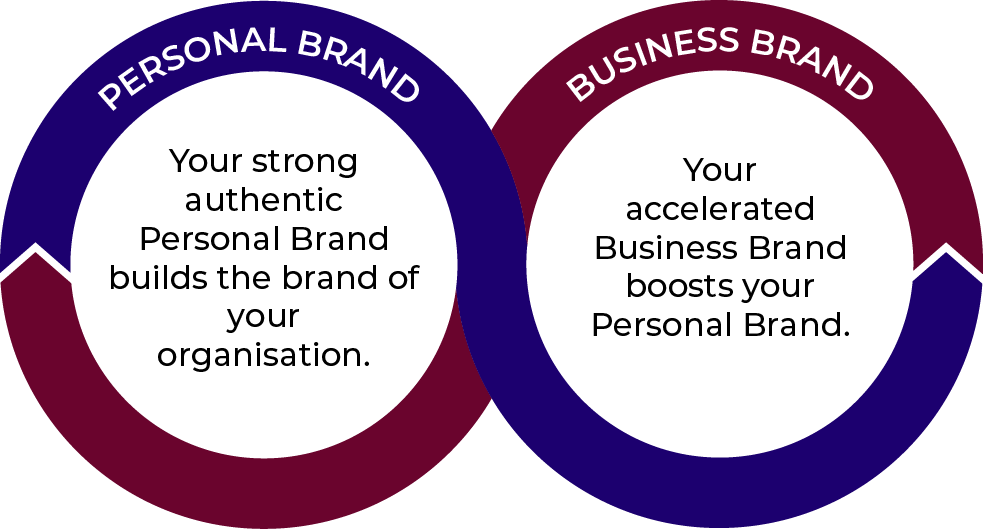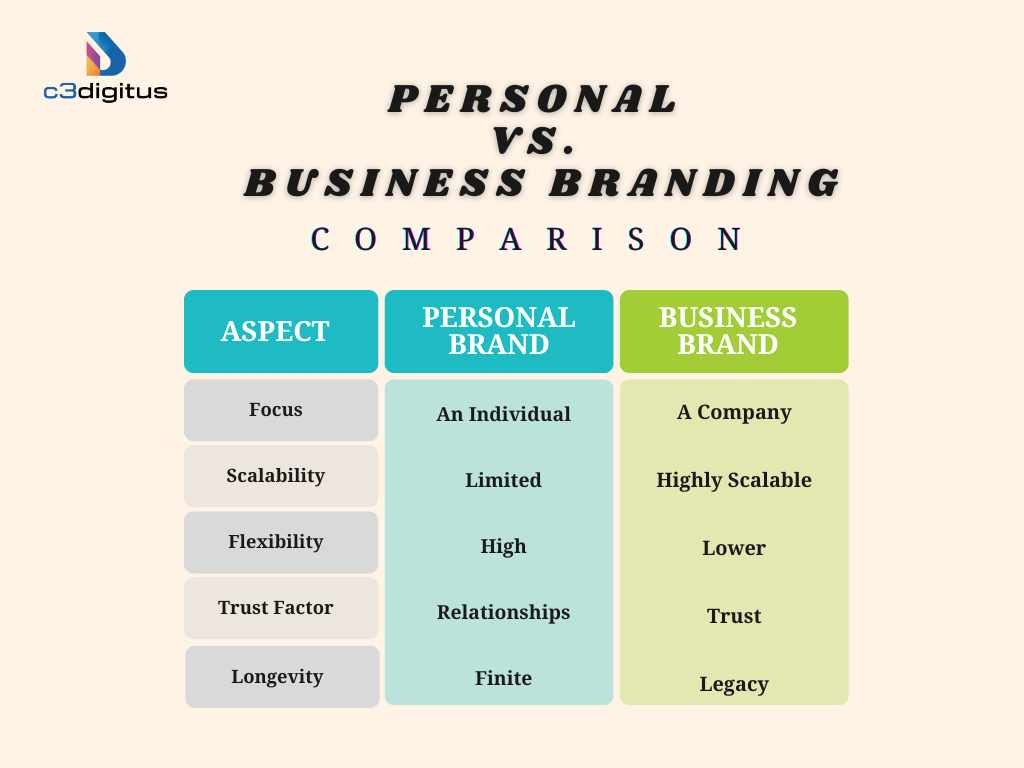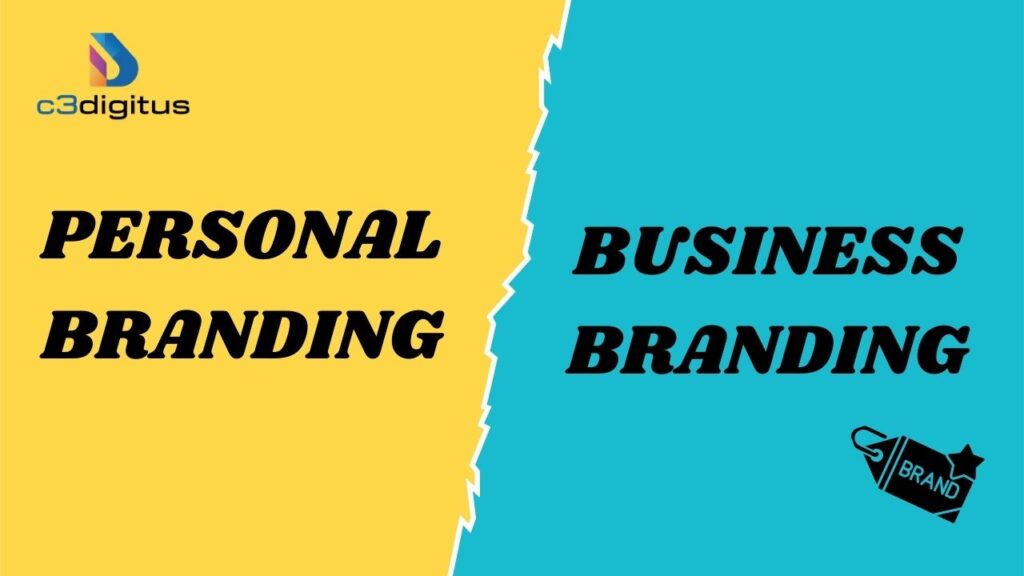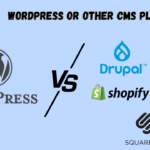You’re about to post an update on LinkedIn. Maybe it’s a big company win or an interesting industry article. You pause, cursor blinking. Do you post it from your personal profile, or should it go on the official company page?
This small moment captures a huge question that almost every entrepreneur, freelancer, and business leader faces: where should I focus my energy—on building my personal brand or my company’s brand?
It feels like a tug-of-war, but it doesn’t have to be. The choice between personal and business branding is one of the most important strategic decisions you’ll make.
So, let’s clear up the confusion. In short, a personal brand is built around an individual’s identity and expertise, while a business brand is built around a company’s collective mission and promise. Understanding the difference will help you invest your time and resources wisely to build the one thing that matters most: trust.
What is Personal Branding? The Power of You
A personal brand isn’t just about having a nice headshot and a polished bio. It’s the ongoing, intentional effort of shaping the public perception of you as an individual. It is the story people tell about you when you’re not in the room.
Think about it as the intersection of your skills, your values, your personality, and your unique perspective. It’s what makes you, you. In other words, if someone tried to copy-paste you, they’d still end up with a glitchy version.
Core Components:
- Authenticity & Storytelling: It’s your journey, your struggles, and your successes. People connect with people, not logos.
- Expertise & Thought Leadership: It’s what you know and the value you share freely with your audience.
- Personal Values & Voice: It’s the principles you stand for and the unique way you communicate.
The ultimate goal of personal branding is to build trust and authority on a human level. When people trust you, they’re much more likely to trust what you sell, recommend, or create.
Take Oprah Winfrey. For decades, people have connected with her not just for her content, but for her empathy, authenticity, and the story behind it all. Her personal brand isn’t just part of her success, it’s the foundation of her entire media empire.

What is Business Branding? The Power of We
While a personal brand is about “you,” a business brand is about “we.” It is the collective identity of your company or organization. It’s the promise your business makes to every customer it serves.
This is where the concept of brand identity becomes crucial. It’s the tangible face of your company. It includes your logo, your color palette, your website design, and the tone of voice you use in your marketing. But it goes deeper than just visuals.
Core Components:
- Mission, Vision, and Values: Why does your company exist beyond making money?
- Visual Identity: The consistent look and feel that makes your company recognizable.
- Customer Experience & Reputation: How your company behaves, treats its customers, and stands by its promises.
The goal of business branding is to build recognition, loyalty, and trust in a company’s products or services, independent of any single person. A strong business brand can outlive its founders and become a legacy.
Think about Nike. The swoosh, the “Just Do It” slogan—it all creates a feeling of determination and athleticism. You have an immediate sense of its brand, which represents greatness and perseverance. That powerful identity exists independently of any single CEO or designer.
Head-to-Head: The 5 Key Differences
So, how do they really stack up against each other? While both aim to build trust, they operate in fundamentally different ways. Seeing them side-by-side makes the distinction crystal clear.
This table breaks it down simply:

As you can see, the path you choose has long-term implications for your flexibility, scalability, and legacy.
The Synergy: When 1 + 1 = 3
Here’s the most important insight: it’s not always an “either/or” choice. The most powerful strategy in modern digital marketing is often making the two work together. It’s not about picking a favorite child; it’s about getting the whole family to work together. A strong personal brand can be the single biggest accelerator for a business brand.
The founder’s personal authority lends a human face and instant credibility to what might otherwise be a faceless company.
The ultimate example of this synergy is Steve Jobs and Apple. Jobs’ personal brand as a visionary perfectionist was baked into Apple’s business brand of innovation and sleek design. When he introduced the iPhone, his personal credibility sold the vision. He so successfully infused his values into the company that the brand continues to thrive on that DNA long after his passing.
A more current example is Elon Musk and Tesla. Musk’s personal brand as a futurist is inseparable from Tesla’s mission to accelerate the world’s transition to sustainable energy. His vision is the company’s story.
Which Path is Right for You?
So, back to the original question. How do you choose? Your decision should be based on your goals and the nature of your work. If you’re considering professional Branding Services, this is the very first question they will help you answer.
Here’s a simple framework to guide you.
Focus on Personal Branding If:
You are a coach, consultant, freelancer, artist, or author. In these roles, your expertise is the product. People are hiring you for your specific skills and perspective. Building your personal brand is non-negotiable, as it directly attracts clients and opportunities.
Focus on Business Branding If:
You are building a company that you want to scale far beyond yourself or potentially sell one day. If you sell physical products or a SaaS platform, the business brand needs to be the hero. You want customers to trust the company, regardless of who is currently on the team. The brand is the asset.
The Hybrid Approach: Best of Both Worlds
This is the most common and effective strategy for modern founders. You start by leveraging your personal brand to build initial trust and traction. You are the company’s first and most passionate evangelist. As the company grows, you gradually transfer that trust and authority over to the business brand, allowing it to develop its own identity and stand on its own two feet.
It’s Not a Battle, It’s a Strategy
Choosing between a personal and a business brand isn’t about picking a winner. It’s about understanding the unique strengths of each and creating a strategy that fits your long-term vision.
It’s a dance, not a duel.
Early on, your personal story might lead the way. Over time, your business brand may take center stage. The key is to be intentional. Every post, every interaction, and every decision is an opportunity to build trust, whether it’s in you or in the company you’re building.




